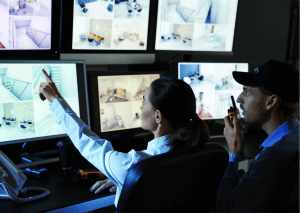
In today’s dynamic and ever-changing world, maintaining security is paramount for businesses and individuals alike. From protecting assets and deterring criminal activity to ensuring the safety of employees and customers, investing in comprehensive security measures is essential. One such solution gaining widespread popularity is Closed-Circuit Television (CCTV) surveillance systems. In this blog post, we’ll explore the benefits and considerations of adding CCTV to your premises, empowering you to make informed decisions and enhance overall security.
Understanding CCTV Surveillance
CCTV surveillance systems utilize cameras, monitors, and recording devices to monitor and record activities in designated areas. Unlike traditional television systems, CCTV operates on a closed circuit, meaning the video feeds are only accessible to authorized personnel. These systems offer real-time monitoring capabilities and the ability to review recorded footage, providing valuable insights into security incidents and facilitating investigations.
Benefits of CCTV Surveillance
- Deterrence of Criminal Activity: The mere presence of CCTV cameras can act as a powerful deterrent to criminal activity. Potential intruders or wrongdoers are less likely to target premises with visible surveillance cameras, knowing their actions are being monitored and recorded. This proactive measure helps prevent security breaches and reduces the risk of theft, vandalism, and other illicit activities.
- Enhanced Monitoring and Surveillance: CCTV surveillance systems provide round-the-clock monitoring of key areas within your premises, ensuring continuous surveillance and rapid response to security threats. With strategically placed cameras covering entrances, exits, parking lots, and high-risk areas, security personnel can monitor activities in real-time and intervene promptly in case of emergencies.
- Investigation and Evidence Gathering: In the event of security incidents or criminal activities, CCTV footage serves as invaluable evidence for investigations and legal proceedings. Recorded video evidence can help identify perpetrators, corroborate witness testimonies, and provide crucial insights into the sequence of events leading up to an incident. This evidence is instrumental in apprehending suspects and prosecuting offenders, leading to higher conviction rates and greater accountability.
- Remote Monitoring and Accessibility: Modern CCTV surveillance systems offer remote monitoring capabilities, allowing authorized users to access live video feeds and recorded footage from anywhere with an internet connection. Whether you’re on-site or miles away, you can stay connected to your premises and respond promptly to security alerts or suspicious activities. This remote accessibility enhances situational awareness and enables proactive security management, even when you’re not physically present.
Considerations for Implementing CCTV
- Legal and Regulatory Compliance: Before installing CCTV surveillance systems, it’s essential to familiarize yourself with relevant laws, regulations, and privacy considerations governing video surveillance in your jurisdiction. Compliance with legal requirements ensures the lawful use of CCTV systems and protects the rights and privacy of individuals captured on camera.
- System Design and Placement: Proper system design and camera placement are critical factors in maximizing the effectiveness of CCTV surveillance. Conduct a thorough security assessment of your premises to identify high-risk areas and determine the optimal placement of cameras for maximum coverage and visibility. Consider factors such as lighting conditions, camera angles, and potential blind spots to ensure comprehensive surveillance.
- Data Storage and Retention: CCTV systems generate vast amounts of video data that must be stored securely and retained for a specified period. Develop a data storage and retention policy outlining the duration and methods of storing recorded footage, as well as access controls and data security measures to prevent unauthorized tampering or deletion of video recordings.
Final Thoughts
Investing in CCTV surveillance is a proactive step towards enhancing security and protecting your premises, assets, and personnel. By deterring criminal activity, facilitating investigations, and providing real-time monitoring capabilities, CCTV systems offer a comprehensive security solution for businesses and individuals alike. However, it’s essential to consider legal compliance, system design, and data management considerations to maximize the effectiveness and benefits of CCTV surveillance. With the right implementation and management, CCTV surveillance systems provide peace of mind and confidence in the safety and security of your premises.
